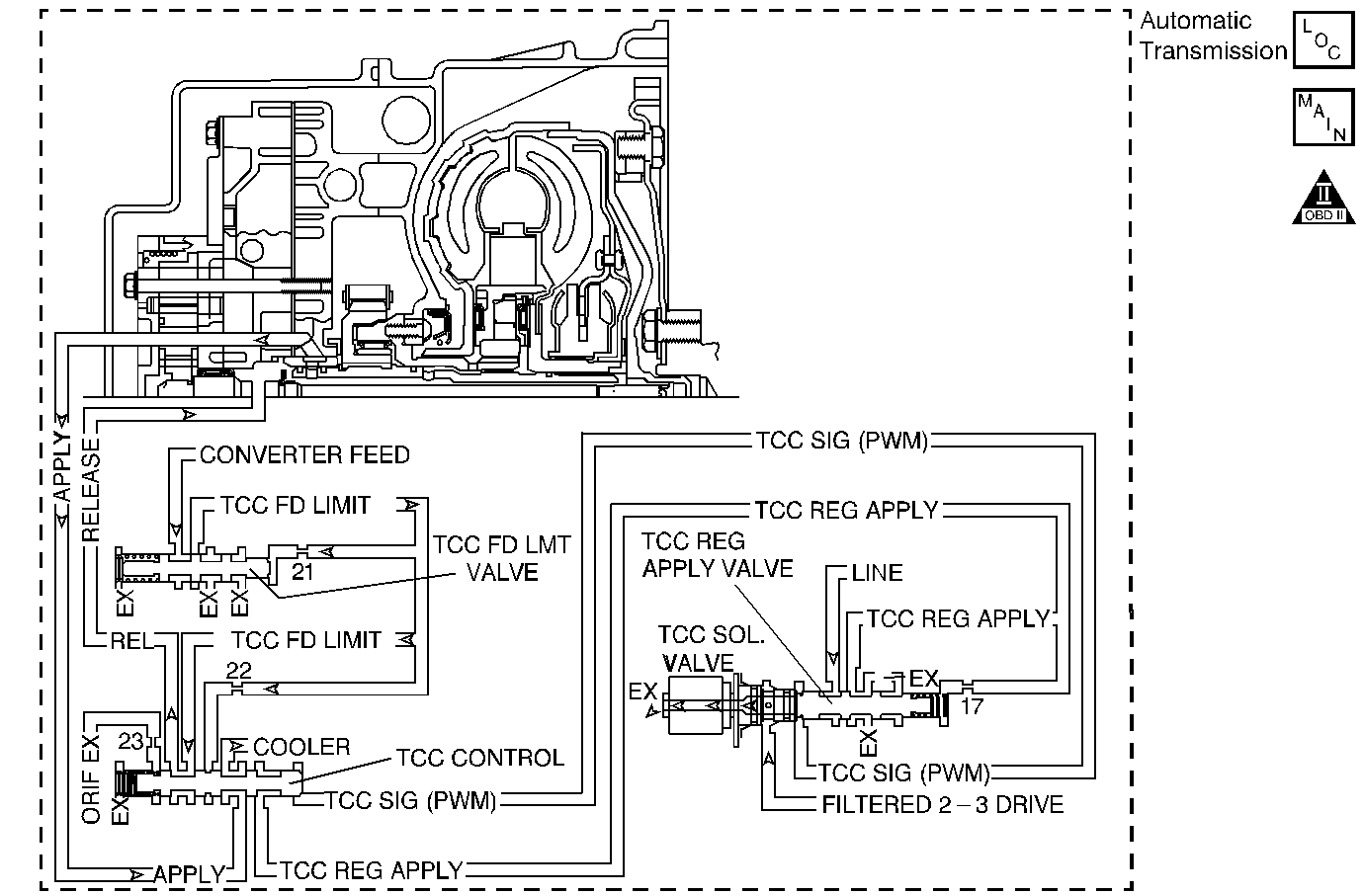
Circuit Description
The torque converter clutch (TCC) solenoid valve is a pulse width modulation (PWM) solenoid. When vehicle operating conditions are appropriate for TCC application, the PCM begins the TCC duty cycle at approximately 42 percent. The PCM then increases the duty cycle up to 90 percent, in order to achieve full TCC-apply pressure.
When the TCC PWM solenoid valve is de-energized, the solenoid blocks filtered 2-3 drive fluid, and allows TCC signal fluid to exhaust. When energized, the solenoid modulates fluid into the TCC signal fluid circuit. When fully energized, modulation stops, and the solenoid blocks both 2-3 drive fluid and TCC signal fluid exhaust.
When the PCM detects a high TCC slip speed when the TCC is commanded ON, then DTC P0741 sets. DTC P0741 is a type B DTC.
Conditions for Running the DTC
| • | No TP DTCs P0121, P0122 or P0123. |
| • | No VSS DTCs P0502 or P0503. |
| • | No TCC stuck ON DTC P0742. |
| • | No TFP manual valve position switch DTC P1810. |
| • | No TCC release switch DTC P1887. |
| • | The time since the gear select lever change is greater than 6 seconds. |
| • | The transmission fluid temperature (TFT) is 21-130°C (70-266°F). |
| • | The TFP manual valve position switch indicates D2, D3, or D4. |
| • | The transmission gear ratio indicates 3rd or 4th gear. |
| • | The TP is 8 percent or greater. |
| • | The PCM commands the TCC ON for greater than 3 seconds. |
Conditions for Setting the DTC
The TCC slip speed is greater than 250 RPM for 8 seconds.
Action Taken When the DTC Sets
| • | The PCM illuminates the malfunction indicator lamp (MIL) during the second consecutive trip in which the Conditions for Setting the DTC are met. |
| • | The PCM inhibits TCC engagement. |
| • | The PCM freezes transmission adapt functions. |
| • | The PCM records the operating conditions when the Conditions for Setting the DTC are met. The PCM stores this information as Freeze Frame and Failure Records. |
| • | The PCM stores DTC P0741 in PCM history during the second consecutive trip in which the Conditions for Setting the DTC are met. |
Conditions for Clearing the MIL/DTC
| • | The PCM turns OFF the MIL during the third consecutive trip in which the diagnostic test runs and passes. |
| • | A scan tool can clear the MIL/DTC. |
| • | The PCM clears the DTC from PCM history if the vehicle completes 40 warm-up cycles without an emission-related diagnostic fault occurring. |
| • | The PCM cancels the DTC default actions when the ignition switch is OFF long enough in order to power down the PCM. |
Diagnostic Aids
| • | Inspect the transmission fluid level. |
| • | The transmission may be in hot mode. Inspect the transmission fluid lines to the radiator. The lines may be pinched, plugged or twisted. |
Test Description
The numbers below refer to the step numbers on the diagnostic table.
-
This step inspects the transmission fluid to ensure that it is at the proper level.
-
This step verifies that the TCC engages when commanded ON by the scan tool.
Step | Action | Value(s) | Yes | No | ||||||||||||||||
|---|---|---|---|---|---|---|---|---|---|---|---|---|---|---|---|---|---|---|---|---|
1 | Did you perform the Powertrain Diagnostic System Check? | -- | Go to Step 2 | Go to Diagnostic System Check - Engine Controls in Engine Controls | ||||||||||||||||
Did you perform the Transmission Fluid Checking Procedure? | -- | Go to Step 3 | Go to Transmission Fluid Check | |||||||||||||||||
Important: Before clearing the DTC, use the scan tool in order to record the Freeze Frame and Failure Records. Using the Clear Info function erases the Freeze Frame and Failure Records from the PCM. Is the slip speed less than the specified value? | 50 RPM | Go to Diagnostic Aids | Go to Step 4 | |||||||||||||||||
4 |
Does the TCC Duty Cycle Short to Volts parameter indicate a short to voltage when the TCC is commanded ON? | -- | Go to Step 8 of DTC P1860 | Go to Step 5 | ||||||||||||||||
5 |
Refer to Transmission Overhaul in Transmission Unit Repair Manual. Did you complete the repair? | -- | Go to Step 6 | -- | ||||||||||||||||
6 | Perform the following procedure in order to verify the repair:
Has the test run and passed? | -- | System OK | Go to Step 1 |
